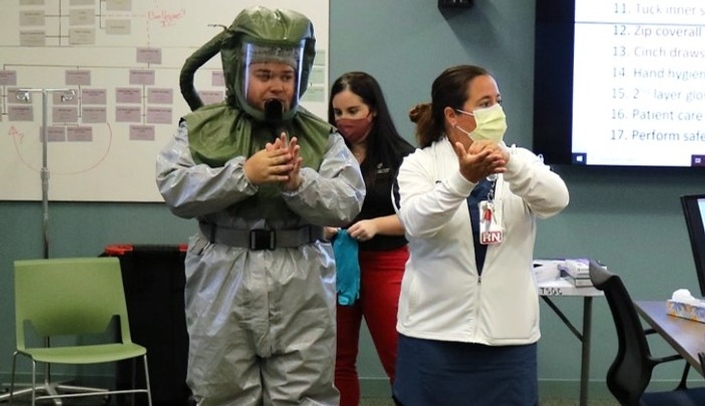The Global Center for Health Security (GCHS) serves as a lead training institution for the National Disaster Medical System (NDMS), and while the COVID-19 pandemic has temporarily delayed regularly-scheduled workshops, a pilot workshop for a new program was led yesterday by the National Strategic Research Institute (NSRI) with assistance from the GCHS. The EMS Infectious Disease Workshop "Managing Highly Hazardous Communicable Diseases: Skills for EMS Providers" was conducted at GCHS’s state-of-the-art Training, Simulation, and Quarantine Center. The workshop was instructed by Dan Polanski, NSRI Deputy Director of Field Operations and Training, and Jake Ferry, NSRI Deputy Director of Plans and Policies. The event was well attended by Bellevue and Omaha Fire and Rescue personnel who volunteered to participate.
The focus of the day included the important topics of communication planning, patient transport, ambulance preparation, ambulance decontamination, and personal protective equipment. After several presentations by Mr. Ferry and Mr. Polanski, GCHS staff members Morgan Shradar and Lauryn Burbridge gave a hands-on presentation regarding proper use of a Powered Air Purifying Respirator (PAPR). With the assistance of a workshop volunteer, Marty Sikes of NSRI, Ms. Shradar and Ms. Burbridge demonstrated donning and doffing procedures while providing instructions and tips on important aspects of infection prevention and control as it relates to PPE.
During the afternoon sessions, all of the workshop participants practiced proper PAPR donning and doffing techniques, including how to provide safe donning and doffing assistance to coworkers since teamwork and a vigilant eye is an important aspect of best practices. Infection prevention and control was also practiced on the Medical Transportation Units—necessary for those transporting a highly infectious patient. Fire and rescue members draped and sealed the interior of three ambulances with plastic to prevent contamination of the rig while transporting a patient with a highly hazardous disease. Protocol for removal, containment, and disposal of the draping was also taught as a hands-on activity in order to further mitigate the risk of spreading a highly infectious disease after the patient has been removed from the rig.
NDMS workshops enable the state and nation’s medical community to provide the best care by teaching the highest standards of infection prevention and control. The GCHS is proud to collaborate and offer these services at their leading edge facility to help protect medical professionals and the community at large. Future trainings will be announced on the GCHS website.
GCHS Hosts Pilot NDMS EMS Training Workshop
- Written by Shannon Becker
- Published Jul 13, 2020

Marty Sikes, NSRI, and Morgan Shradar, UNMC/NM, practice hand hygiene while donning PAPR